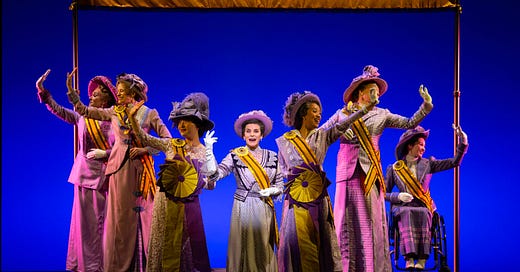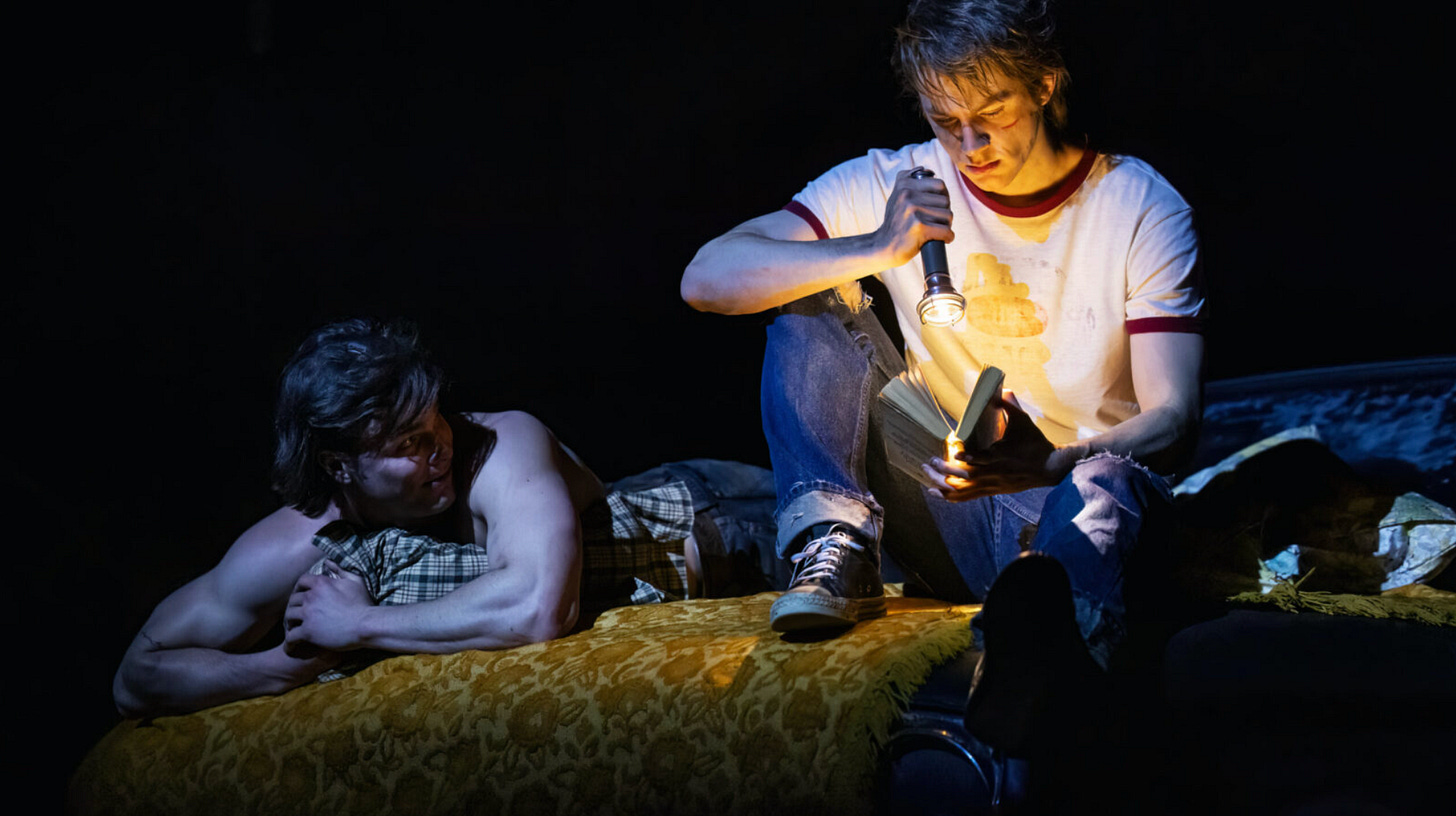NY Reviews: "Suffs" is a moving, inspiring showcase of women past and present
"The Outsiders" dazzles with fire, water, and sweet-voiced young men, but read the book first
Hello, play-goers! Here are my last reviews of shows in the 23-24 Broadway season. You can see performances from these and other nominated shows on the Tonys, tomorrow night at 8p on CBS and Paramount+.
The excellent “Suffs” is full of heart and history
Can you believe there was really a time when women couldn’t vote? Perhaps you’ve only ever considered it in the abstract, focused more on the moment they gained that right with the passage of the 19th Amendment in 1920. Well, the new Broadway musical “Suffs” will explode your consciousness. It’s a smart, heartfelt, funny, and moving show that portrays some of the key women who fought hard for that right over decades.

Women are telling the story here, from Shaina Taub, who wrote the music, lyrics, and book, to director Leigh Silverman, choreographer Mayte Natalio, and an excellent, all-women ensemble. They do so with panache, delivering an action-packed, emotionally stirring story. Right from the start, we are dropped into the middle of the movement and ride the wave of the fight, seeing the challenges they endure along the way: marching in the bitter cold, facing arrest, and ultimately abuse in prison. “How will we do it when it’s never been done?” they sing. The stakes of the fight and the consequences they face for agitating are brought into sharp relief through the compelling characters and Silverman’s invigorating staging. Natalio keeps the ensemble moving, building momentum and giving their struggle a potent physicality.

The great strength of the show is that it creates drama in two dimensions: the obvious one of the Suffragists versus the system, and the far more interesting one of the characters disagreeing on the right tactics and approach in that fight. The former makes you care about all the characters; the latter helps to bring out the individuality of each as they push, pull, and organize.
The most well-developed of these conflicts is between Carrie Chapman Catt and Alice Paul. Catt opens the show with a jazzy number, “Let Mother Vote,” where she implores the men at her annual suffrage luncheon to support the movement. Catt—played with poise and restraint by Jen Colella—embodies the essence of respectability politics: don’t push too hard, show deference, build support slowly. “It won’t disrupt your lives / We’ll still be loyal wives,” she sings.
Paul, played by Taub, bursts in with new ideas: let’s stage a march! She cares as passionately as Catt but is younger and eager to “finally finish the fight.” They are two people with the same goal but different visions for how to get there, holding begrudging respect for each other but never quite reconciling, even once their shared goal is reached.
Paul is indefatigable, celebrating each win only briefly before setting her sights on the next hurdle. For example, when the 19thamendment is finally passed, she immediately pivots to fighting for the Equal Rights Amendment. As written and played by Taub, this quality is not universally celebrated. One of several moments of self-doubt by the Suffs is the song “Worth It,” where Paul questions her choice to pursue endless organizing to the exclusion of marriage or much of a personal life. This resonates: how many people do you know who put themselves second to their cause?
The Catt-Paul conflict is the most well-rounded, but the show makes room for others, if sketched in less detail. The four women who join Paul in the fight are each given their own backstories and arc, especially Inez Milholland, the glamorous public speaker brought to life by a compelling Hannah Cruz. African-American activists Ida B. Wells (a fiery Nikki M. James) and Mary Church Terrell (Anastacia McCleskey) lead a parallel, sometimes intertwined, effort. They have their own disagreement about whether to join the white-led Suffrage movement even when it puts racial equality second. The inclusion of these characters helps illustrate the movement’s lack of attention to racial equality.

Composer and performer Shaina Taub has been making great theatre for some time. Her Shakespeare adaptations for the Public Theater of “Twelfth Night” and “As You Like It” are full of fantastic, innovative numbers that tell those stories through music. Her solo albums, like “Songs of the Great Hill,” are also excellent. Suffs marks her Broadway debut with a score based in an early jazz style for the older suffragists and a more modern pop-infused sound for the younger ones. If uneven at times, many of the songs are knock-outs, and all are effective in conveying character and plot.
A relatively simple set design from Riccardo Hernández alternates grand, capitol-esque columns for the big protest scenes with a giant wood-paneled wall that effectively evokes the early 20th century offices where the Suffs plot their tactics. Paul Tazewell’s costumes also speak to the period with beautiful, well-tailored skirt-suits, activist sashes, and wonderful hats. One includes a giant feather, showing its wearer’s wealth and proclivity to literally take up space.
In a coda that jumps to the 1970s, Alice Paul meets a young, second-wave feminist activist with new ideas about how to fight for women’s rights. Now it’s Paul that is the old guard. This scene nicely conveys the show’s overall thesis: the fight never ends; one generation just trains the next and passes on their legacy. This and many other moments give the show a humility about the complexity of the suffrage movement, making the play equal parts celebration of the incredible success of that struggle and honest portrayal of the tricky dynamics of activism work.
The show ends with a message to today’s activists: “Your ancestors are all the proof you need / That progress is possible, not guaranteed. / It will only be made if we keep marching, keep marching on.” At a time when so many face injustices, equality is far from assured, and women’s reproductive rights in particular have been trampled on, it’s a truly inspiring message to a new generation of activists. May they learn from the struggles of their foremothers, “Suffs” asserts grandly.
Open run playing at the Music Box on Broadway.
“The Outsiders” is impressive, but best if you’ve read the book
Pony Boy, the lead and narrator of “The Outsiders,” a new musical adaption of the novel by S.E. Hinton playing at the Bernard B. Jacobs Theatre, is a knot of contradictions. Brody Grant, with his innocent eyes, swept-back hair, and aching vocals, brings out the teenager’s vulnerability. His interest in reading and writing make him stand out from his rough-and-tumble gang community. Orphaned and being raised by his older brothers, he’s stuck between his passion for Dickens and fitting in as a “Greaser.” In songs like “Great Expectations,” where he compares his life to that of the orphan Pip in that classic novel, he makes you feel his longing for something more than his impoverished, gang-oriented life.
His oldest brother (a moving Brent Comer) wrestles with his obligation to work hard to care for his siblings; their friend Johnny Cade (a sweet-voiced Sky Lakota-Lynch) deals with his parents’ violent fighting; and Dallas Winston (Joshua Boone, who’s given the best songs and delivers on their potential) is a drifter, coming into towns and leaving when things get hard. They are all struggling in a world that doesn’t seem to care much about them.
Director Danya Taymor and scenic designer AMP featuring Tatiana Kahvegian situate these young men on a single set consisting of gravel (made of rubber pellets), wooden planks, an old car (which sometimes becomes a bed), and a backdrop of a falling-apart building. The cast moves around the wooden planks to form bleachers at a drive-in theatre, a hospital bed, and many other settings. I like theatre like this that invites the audience to think a little bit to co-create the settings in our shared imagination. But the show also pulls out all the stops: for example, real fire lights up a pivotal moment. The director has described her approach as “elemental:” water, fire, earth, air. The water comes during the show’s grand climax, when rain pours down on the gangs as they fight at a rumble. Powerful choreography by Rick Kuperman and Jeff Kuperman has the cast rolling in the gravel and throwing punches at close quarters, illuminating the sheer brutality of such violence. (Here’s a fascinating article about how they created that scene.)
The music (from Jonathan Clay, Zach Chance, and Justin Levine) suits the 1960s Tulsa, Oklahoma setting, sitting somewhere between pop, rock, soul, and blues, with folk-y orchestrations from Levine. At times, the music is a little heavy-handed and the lyrics falter, but they do the trick of dialing up the emotional content and setting the scene.
For all these strengths, however, the musical still did not move me in the way it should have due to gaps in the storytelling and a lack of clear connection between actions and reactions among the characters. For example, the opposing gang, the Socs (short for Socialites) are of a higher socioeconomic class than the Greasers, as thoroughly explained through song lyrics, evoked visually through Sarafina Bush’s costumes (clean letter jackets for the Socs; dirty undershirts and jeans for the Greasers), and furthered through movement (traditional mid-century dances for the Socs; rougher, kinetic movements for the Greasers.) Ok, we get it. But if this group of young people have such superior economic prospects to the Greasers, why are they in a gang at all?
The book (by Adam Rapp and Justin Levine) lacks clarity at pivotal moments, like the fire scene. Pony Boy and Johnny have fled town after a bad run-in with the Socs. When Pony Boy flicks a cigarette, starting a fire at their church hide-out, he and Johnny rush in to save children trapped inside. Small tweaks to the storytelling here would’ve made it clearer that Pony Boy started the fire and so feels responsible to save the children: immediate flames or red lighting after he flicks his cigarette towards the building, for example. While visually stunning, the whole scene felt like it came out of nowhere.
My lack of engagement was way out of step with the people around me. The audience was packed with young people, who hollered as the show began, trilled when a very buff Jason Schmidt (playing another brother of Pony Boy) pulled off his shirt, and gave raucous applause after every musical number. Why am I not as into this as everyone else? I kept thinking. The only answer I could come up with is that they have read the book, maybe quite recently, and it must be thrilling to see a story they already know well play out before them in three dimensions, with attractive young men singing catchy tunes amidst spectacular technical elements.
At the very end of the show, Pony Boy writes the beginning lines of what will become the novel “The Outsiders,” and hands what looked like a copy of that book to an audience member in the front row. I love a meta-theatrical moment, but this felt like a bit too on-the-nose. The gesture was emblematic of the overall experience: a crowd-pleasing celebration of a beloved story, versus a fresh interpretation accessible to those who haven’t read the book.
Open run playing at the Bernard B. Jacobs Theatre on Broadway.










